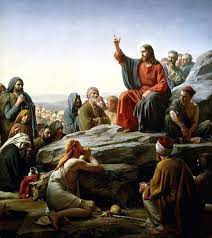The Creeds
- The Rev. Thomas C. Pumphrey

- Feb 2, 2023
- 2 min read
“…recite them to your children and talk about them when you are at home and when you are away, when you lie down and when you rise. Bind them as a sign on your hand, fix them as an emblem on your forehead, and write them on the doorposts of your house and on your gates.” Deuteronomy 6:7-9
Dear Friends in Christ,

Each Sunday, we recite the Nicene Creed. When we have a baptism (or in Morning Prayer or Evening Prayer), we recite the Apostles’ Creed (compare the two creeds here). Why do we say one of the creeds each week? The creeds came from a basic formula of questions and answers used at Baptism: basic statements about God as Father, Son and Holy Spirit. These formulas expanded to answer early heresies that denied Jesus’ full humanity (thus the emphasis that he was born, suffered, died). The Nicene Creed built upon those early formulas to emphasize Jesus’ full divinity (God from God, one being with the Father…). The Creeds describe who God is, and how we are in relationship with God. The clause about God the Holy Spirit also describes the church, through whom the Holy Spirit is working. The creeds are a “definition of faith,” clarifying who God is and what we believe about God; a “rule of faith” marking the boundaries for the shared belief of the church; and a “profession of faith,” when each of us as individuals profess for ourselves our assent to and submission to the faith of the church. The Creeds are statements of belief and faith—intellectual claims about the reality of God, and claims about what we trust to be true, and in whom we put our trust. We do not believe in God the way someone might “believe” in the Loch Ness monster. If the Loch Ness monster were real, it would have no impact on us personally. Our belief in God is much different, for God is the one in whom we put our trust, the one whose love for us we respond to, the one we follow. In Greek, the words for faith and belief share the same root. Archbishop Rowan Williams calls the creeds “Tokens of Trust” in his book with the same title, introducing the creeds. We recite the creeds each week to ground ourselves in particular claims of reality, claims that compel our trust and commitment, that draw from us thanksgiving for the one “who, for us and for our salvation” came down from heaven, lived and died and rose again—for us. The Creeds are a profession and an assurance, a cause for rejoicing and ultimately a prayer. We attempt to describe the indescribable God, and we put trust in the one who is beyond us, but who comes to us to embrace us. Indeed the creeds are prayers, for they end in “AMEN!” Learn more about the creeds here. And the next time you recite the creeds, consider the great cloud of witnesses who join with you, and the magnitude of God’s grace we celebrate together. Yours in Christ, -Tom




